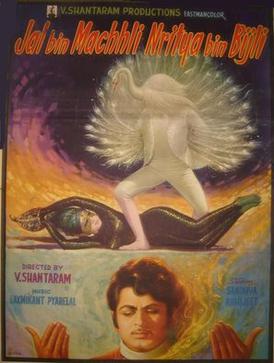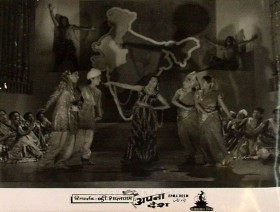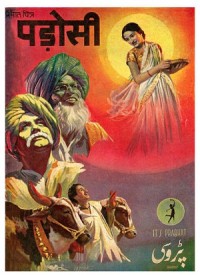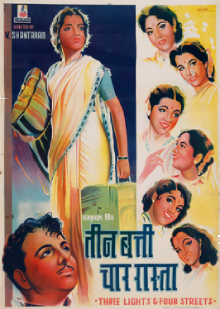Vasant Desai (1912–1975) was an Indian film music composer, most remembered for his score in V. Shantaram films like Jhanak Jhanak Payal Baaje (1955), Do Aankhen Barah Haath (1957), Vijay Bhatt's Goonj Uthi Shehnai (1959), Sampoorna Ramayan (1961), Ashirwad (1968) and Hrishikesh Mukherjee's Guddi (1971).

Keshavrao Date (1889–1971) was an Indian film actor, who worked in both silent and sound movies. He tried to run his own drama company but found it difficult to perform the dual roles of manager and actor.

Jal Bin Machhli Nritya Bin Bijli is a 1971 Bollywood romance film directed by V. Shantaram, with Sandhya and Abhijeet as leads, along with Vatsala Deshmukh and Dina Pathak.

Navrang is a 1959 Indian Hindi-language film co-written and directed by V. Shantaram. The film is noted for its dance sequences with lead actress Sandhya and music by C. Ramchandra, while playback singer Mahendra Kapoor made his singing debut with the song Aadha Hai Chandramaa Raat Aadhi.
Rajkamal Kalamandir was a noted film production company and studio in Mumbai. It was established by V. Shantaram in 1942, after he left Prabhat Films. The studio produced films both in Hindi and Marathi, and it was best known for Dr. Kotnis Ki Amar Kahani (1946), Amar Bhoopali (1951), Jhanak Jhanak Payal Baaje (1955), Do Aankhen Barah Haath (1957), Navrang (1959) and Pinjra (1972). In its heyday, Rajkamal was one of the most sophisticated studios of the country.
The 9th Annual Bengal Film Journalists' Association Awards was held on 1946, honoring the best Indian cinema in 1945.

Apna Desh is a 1949 Hindi social drama film set against the backdrop of Partition and directed by V. Shantaram for his Rajkamal Kalamandir banner.

Shejari is also known as Padosi in Hindi version as. Padosi is a 1941 Indian social drama film directed by V. Shantaram. It was produced by Prabhat Film Company and the bilingual film in Marathi and Hindi was the last film Shantaram made for Prabhat before venturing to form his Rajkamal Kalamandir. The film is cited as one of the three social classics Shantaram made at Prabhat. The other two were Duniya Na Mane (1937) and Aadmi (1939). The story and dialogue were by Vishram Bedekar in the Marathi version, while the dialogues in the Hindi version were by Pandit Sudarshan, who also wrote the lyrics. The music director was Master Krishnarao. The famous character artist Radhakrishan made his acting debut in the film as a villain. The film starred Mazhar Khan, Gajanan Jagirdar, Anees Khatoon, Radha Kishan, Lajwanti, Sumitra, Gopal and Balak Ram.

Shakuntala is a 1943 drama film based on Kālidāsa's Sanskrit drama Abhijñānaśākuntalam, directed by V. Shantaram. It was the first film made under the newly formed Rajkamal Kalamandir banner that Shantaram had started. It was the first film to be shown commercially in US. Adapted from the Shakuntala of Kalidas the screenplay was by Diwan Sharar. Music was composed by Vasant Desai with lyrics by Diwan Sharar and Ratan Piya. The cinematatography was by V. Avadhoot and the film starred Kumar Ganesh, Jayashree, Chandra Mohan, Ameena, Shantaram, Zohra and Nana Palsikar.

Ladki Sahyadri Ki is a 1966 Hindi social drama film directed by V. Shantaram. Also called Iye Marathichiye Nagari in Marathi, it was a bilingual for V. Shantaram productions under the Rajkamal Kalamandir banner. The music was composed by Vasant Desai, with lyrics by Bharat Vyas. The cast included Sandhya, Shalini Abhyankar, Vatsala Deshmukh, Kumar Dighe, Keshavrao Date, and Baburao Pendharkar.

Parchhain (Shadow) is a 1952 Hindi romantic melodrama film directed by V. Shantaram. The production company was Rajkamal Kalamandir. The story and dialogue were by Shams Lakhnavi, with cinematography by G. Balakrishna. Music direction was by C. Ramchandra and the lyricists was Noor Lakhnavi.

Surang is a 1953 film directed by V. Shantaram for his Rajkamal Kalamandir banner. The story and dialogue were by Vinod Kumar with music by Shivram Krishna and lyrics by Shewan Rizwi. The actor Chandrashekhar came into prominence with his role of a miner in the film. The rest of cast included Shashikala, Sheila Ramani, Vinod Kumar, Ulhas and Vikas.

Teen Batti Char Raasta is a 1953 Hindi-language comedy drama film on national integration directed by V. Shantaram. The film was made under the Rajkamal Kalamandir banner and produced by Shantaram. The story and dialogue were by Diwan Sharar while the cinematography was by G. Balkrishna. With music composed by Shivram Krishna, it had lyrics by Pyare Lal Santoshi. The star cast included Karan Dewan, Sandhya, Shashikala, Nirupa Roy, Sheila Ramani, Dewan Sharar and Lalita Kumari.

Subah Ka Tara is a 1954 Hindi social romantic film directed by V. Shantaram. The film was produced by Rajkamal Kalamandir and had story and dialogues by Shams Lucknavi. The director of photography was G. Balkrishna. It had music composed by C. Ramchandra and the lyricists were Noor Lakhnavi and Diwan Sharar. The title song "Chamka Chamka Subah Ka Tara" was one of the notable songs from this film. Rajshree appeared in her debut role as a child star. The cast included Pradeep Kumar, Jayshree, Amirbai Karnataki, Rajshree, Shakuntala Paranjpye and Naaz.

Dahej (Dowry) is a 1952 Hindi social family drama film based on the dowry system directed by V. Shantaram. Produced by Rajkamal Kalamandir, the director of photography was V. Avadhoot. Music was composed by Vasant Desai with lyrics by Shams Lucknavi, who also wrote the story and dialogues. The film starred Prithviraj Kapoor, Karan Dewan, Jayshree, Ulhas, Mumtaz Begum, Keshavrao Date and Lalita Pawar.

Lokshahir Ram Joshi also called Matawala Shair Ram Joshi in Hindi, is a 1947 Marathi biopic film of the poet Ram Joshi, written by G. D. Madgulkar, directed by Baburao Painter and co-directed by V. Shantaram. Shantaram had given the direction to Painter but had to complete the film when Painter fell ill during production. Produced under the Rajkamal Kalamandir banner, it is also referred to as Lok Shahir Ramjoshi. The story writer was G.D. Madgulkar, who is cited as the "first specialist film writer" in Marathi cinema. This film was his first "full-fledged writing assignment", wherein he wrote the story, screenplay, dialogue and lyrics. It was also his debut as a screenplay writer. The film starred Jayaram Shiledar as Ram Joshi and Hansa Wadkar as Baya. The rest of the cast included Shakuntala Paranjpye, Parashuram, Sudha Apte and G. D. Madgulkar.

Do Phool is a 1958 Indian Hindi-language family drama film directed by A. R. Kardar. Adapted from the 1881 children's novel Heidi by Johanna Spyri, Baby Naaz plays the role of Poornima (Heidi). The film was produced by Akhtar Sultana Kadar with dialogues written by Krishan Chander. The music director was Vasant Desai, and the lyrics were written by Hasrat Jaipuri. The film starred Romi, Baby Naaz, Vijaya Choudhary, Bipin Gupta, Ulhas, David, Agha, and Jeevan.

Karan Dewan was an Indian cinema actor in Hindi films. He worked in over seventy films from 1941 to 1979. He started as a journalist while still in college, editing a film-based magazine in Urdu. His brother was the film producer and director Jaimani Dewan.

Vanamala or Vanmala Devi (1915-2007) was an Indian actress, appearing in many films in Hindi and Marathi. She is best known for the role of the mother in the Marathi movie Shyamchi Aai, which won the Golden Lotus Award (Swarna Kamal) for Best Film at the 1st National Film Awards in 1954.

Ulhas was an Indian actor, who played character roles in Hindi cinema from the late 1930s to the early 1980s. However, since he died in 1969, many of his films were released after his death.
















